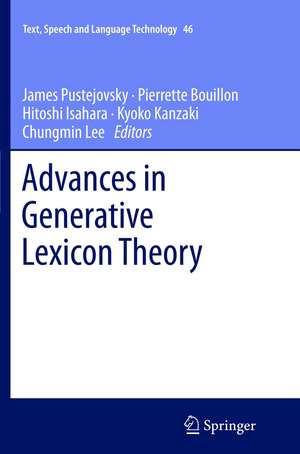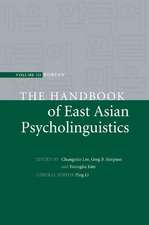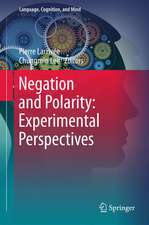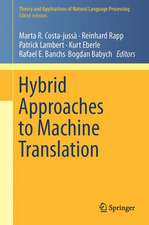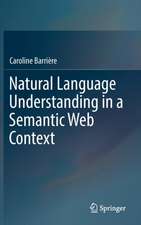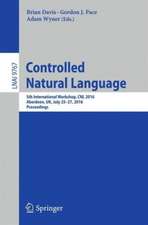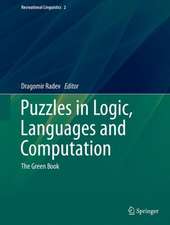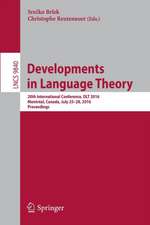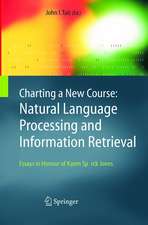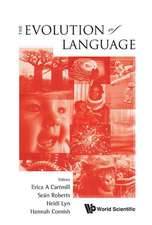Advances in Generative Lexicon Theory: Text, Speech and Language Technology, cartea 46
Editat de James Pustejovsky, Pierrette Bouillon, Hitoshi Isahara, Kyoko Kanzaki, Chungmin Leeen Limba Engleză Paperback – 29 ian 2015
| Toate formatele și edițiile | Preț | Express |
|---|---|---|
| Paperback (1) | 996.88 lei 6-8 săpt. | |
| SPRINGER NETHERLANDS – 29 ian 2015 | 996.88 lei 6-8 săpt. | |
| Hardback (1) | 1003.50 lei 6-8 săpt. | |
| SPRINGER NETHERLANDS – 18 dec 2012 | 1003.50 lei 6-8 săpt. |
Din seria Text, Speech and Language Technology
-
 Preț: 391.79 lei
Preț: 391.79 lei - 20%
 Preț: 652.54 lei
Preț: 652.54 lei - 18%
 Preț: 954.14 lei
Preț: 954.14 lei - 18%
 Preț: 952.89 lei
Preț: 952.89 lei - 18%
 Preț: 945.30 lei
Preț: 945.30 lei - 18%
 Preț: 1222.94 lei
Preț: 1222.94 lei - 18%
 Preț: 954.31 lei
Preț: 954.31 lei - 18%
 Preț: 949.73 lei
Preț: 949.73 lei - 15%
 Preț: 640.06 lei
Preț: 640.06 lei - 15%
 Preț: 646.94 lei
Preț: 646.94 lei - 18%
 Preț: 949.37 lei
Preț: 949.37 lei - 20%
 Preț: 651.89 lei
Preț: 651.89 lei - 15%
 Preț: 644.30 lei
Preț: 644.30 lei - 18%
 Preț: 961.55 lei
Preț: 961.55 lei - 20%
 Preț: 1006.12 lei
Preț: 1006.12 lei - 18%
 Preț: 955.56 lei
Preț: 955.56 lei - 20%
 Preț: 993.09 lei
Preț: 993.09 lei - 15%
 Preț: 642.51 lei
Preț: 642.51 lei -
 Preț: 389.49 lei
Preț: 389.49 lei - 20%
 Preț: 643.17 lei
Preț: 643.17 lei - 18%
 Preț: 947.50 lei
Preț: 947.50 lei - 20%
 Preț: 993.93 lei
Preț: 993.93 lei - 18%
 Preț: 953.03 lei
Preț: 953.03 lei - 18%
 Preț: 951.91 lei
Preț: 951.91 lei - 15%
 Preț: 645.14 lei
Preț: 645.14 lei - 18%
 Preț: 953.97 lei
Preț: 953.97 lei
Preț: 996.88 lei
Preț vechi: 1246.10 lei
-20% Nou
Puncte Express: 1495
Preț estimativ în valută:
190.75€ • 199.16$ • 157.87£
190.75€ • 199.16$ • 157.87£
Carte tipărită la comandă
Livrare economică 05-19 aprilie
Preluare comenzi: 021 569.72.76
Specificații
ISBN-13: 9789400795860
ISBN-10: 9400795866
Pagini: 496
Ilustrații: VIII, 488 p.
Dimensiuni: 155 x 235 x 26 mm
Greutate: 0.69 kg
Ediția:2013
Editura: SPRINGER NETHERLANDS
Colecția Springer
Seria Text, Speech and Language Technology
Locul publicării:Dordrecht, Netherlands
ISBN-10: 9400795866
Pagini: 496
Ilustrații: VIII, 488 p.
Dimensiuni: 155 x 235 x 26 mm
Greutate: 0.69 kg
Ediția:2013
Editura: SPRINGER NETHERLANDS
Colecția Springer
Seria Text, Speech and Language Technology
Locul publicării:Dordrecht, Netherlands
Public țintă
ResearchCuprins
Chapter 1: Introduction .- Chapter 2: Type Theory and Lexical Decomposition .- Chapter 3: A Type Composition Logic for Generative Lexicon .- Chapter 4: Lexical Representation, Co-composition, and Linking Syntax and Semantics .- Chapter 5: The Telic Relationship in Compounds .- Chapter 6: Metonymy and Metaphor: Boundary Cases and the Role of a Generative Lexicon .- Chapter 7: Spanish Clitics, Events and Opposition Structure .- Chapter 8: Adjective-noun Combinations and the Generative Lexicon .- Chapter 9: Combination of the Verb Ha- ‘Do’ and Entity Type Nouns in Korean: A Generative Lexicon .- Chapter 10: Generative Lexicon Approach to Derived Inchoative Verbs in Korean .- Chapter 11: Degree Vs. Manner Well: A Case Study in Selective Binding .- Chapter 12: V-concatenation in Japanese .- Chapter 13: Change of Location and Change of State .- Chapter 14: Event Structure and the Japanese Indirect Passive .- Chapter 15: Developing a Generative Lexicon Within HPSG .- Chapter 16: Purpose Verbs .- Chapter 17: Word Formation Rules and the Generative Lexicon: Representing Noun-to-Verb Versus Verb-to-Noun Conversion in French .- Chapter 18: Boosting Lexical Resources for the Semantic Web: Generative Lexicon and Lexicon Interoperability .- Chapter 19: Automatic Acquisition of GL Resources, Using an Explanatory, Symbolic Technique .- Chapter 20: The Semi-generative Lexicon: Limits on Productivity .
Textul de pe ultima copertă
This collection of papers takes linguists to the leading edge of techniques in generative lexicon theory, the linguistic composition methodology that arose from the imperative to provide a compositional semantics for the contextual modifications in meaning that emerge in real linguistic usage. Today’s growing shift towards distributed compositional analyses evinces the applicability of GL theory, and the contributions to this volume, presented at three international workshops (GL-2003, GL-2005 and GL-2007) address the relationship between compositionality in language and the mechanisms of selection in grammar that are necessary to maintain this property. The core unresolved issues in compositionality, relating to the interpretation of context and the mechanisms of selection, are treated from varying perspectives within GL theory, including its basic theoretical mechanisms and its analytical viewpoint on linguistic phenomena.
Caracteristici
Informative articles on basic theoretical mechanisms, analysis, interfacing and building Generative Lexicon related resources Original contributions from outstanding scholars in computational and theoretical linguistics The latest developments and trends in the Generative Lexicon Theory
